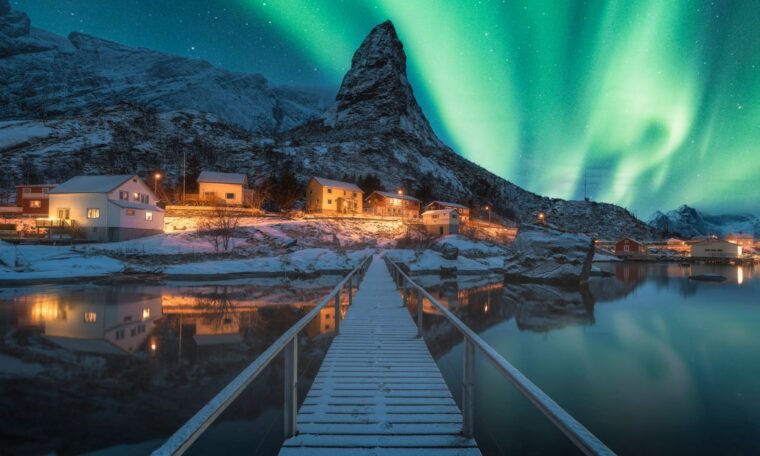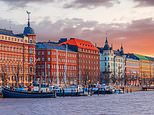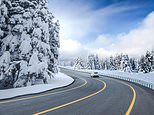
Most travelers plan their adventures around daylight, with early starts, packed itineraries and nonstop sightseeing. But once the sun sets, a different kind of explorer emerges: the noctourist.
Noctourism is a growing trend offering a fresh perspective on travel. From chasing the northern lights to exploring moonlit markets to spotting nocturnal wildlife, more travelers are discovering that some of the most magical moments happen after dark.
So, what exactly is noctourism, and what does it entail? Below, experts break it down.
What is noctourism?
“Noctourism, or nocturnal tourism, involves exploring destinations and attractions after dark, focusing on astronomical and nighttime experiences,” said Lauren Gumport, a travel expert with Faye Travel Insurance. “Activities range from stargazing in certified dark sky parks to moonlit wildlife safaris, offering travelers a new perspective on familiar landscapes.”
She pointed to a Booking.com survey about 2025 travel trends, which found that 59% of Americans are considering celestial-themed trips, noting interest in starbathing experiences, constellation tracking and once-in-a-lifetime cosmic events.
“Noctourism is a growing travel trend focusing on nighttime activities and adventure like aurora borealis, night safaris and even performances, night markets and tours,” said Suzanne Morrow, CEO of InsureMyTrip.
Many in the travel industry have observed a growing interest in nighttime adventures and connection with the universe.
“Noctourism is very popular right now,” said Valerie Dulin, a product manager with the tour operator Tauck. “For example, Tauck’s small ship cruise Arctic Days and Northern Lights sold out for 2026 before prices were even live.”
Emmanuel Burgio, founder of the bespoke tour operator Blue Parallel, has similarly observed an increase in demand for unique after-dark experiences like the company’s Northern Lights tours in Scandinavia and its Atacama Desert stargazing option with an expert astronomer.
“We’ve been enjoying curating more extraordinary night-time experiences for our clients, such as private nocturnal wildlife expeditions in the Pantanal, where travelers can witness the magical creatures of the night in their natural habitat, including anacondas, jaguars, caymans and more,” he said.
Caimans sit on the banks of the almost dried-up Bento Gomes River in the Pantanal wetlands near Pocone, Mato Grosso state, Brazil, Wednesday, Nov. 15, 2023.
Gumport highlighted other great noctourism destinations, like Desengano State Park in Brazil, Kozushima Dark Sky Island in Japan, Teide National Park in the Canary Islands and Kejimkujik National Park in Canada. U.S. travelers don’t even have to venture so far to experience this type of tourism.
“With increasing interest in space and the cosmos, destinations like Griffith Observatory in Los Angeles attract over a million stargazers annually,” Gumport said.
What are the benefits of noctourism? Any downsides?
“Noctourism lets travelers dodge the heat, skip the crowds and see a place in a whole new way,” said Leigh Barnes, president of Americas at Intrepid Travel. “From night safaris in Kenya to stargazing in the Atacama, the after-dark experiences are often the most memorable. It also helps ease the pressure on busy sites and creates more genuine connections with local communities.”
Gumport also highlighted the opportunity to get a less-crowded travel experience beyond peak hours, all while fostering a cosmic connection.
“Nighttime exploration allows travelers to enjoy popular sites without the daytime heat and congestion,” she said. “The tranquility of nighttime travel provides a unique sense of adventure and serenity.”
For those who’ve dabbled in noctourism, the magic of the experience can be difficult to put into words.
“It’s amazing when you see it first-hand,” Dulin said of viewing the northern lights. “I found that waiting and watching for the aurora was just as fun as the moment it appeared. Even clouds don’t ruin the experience. Some of my most memorable views were when the aurora peeked behind the clouds and shone through small clearings.”
© Marco Bottigelli via Getty Images
Noctourism is an increasingly popular approach to travel.
Noctourism can offer benefits to the destination as well as to travelers.
“For host destinations, it extends tourist spending beyond daytime activities,” Morrow said.
And there are benefits in terms of sustainability in exploration. The Booking.com survey found a majority of travelers were inclined to book accommodation that encouraged less light pollution and helped preserve local flora and fauna. About half of the respondents also reported interest in nighttime pursuits to avoid rising daytime temperatures and UV ray exposure.
“Nighttime activities such as stargazing and eco-friendly night tours offer low-impact ways to connect with nature,” Gumport said.
That being said, rising interest in after-dark tourism might also lead to increased nighttime noise and other annoyances for locals. There are also potential downsides for travelers to consider.
“It does take a bit more planning,” Barnes said. “Not everything runs at night, and safety matters.”
“A major downside is safety, including theft and accidents,” Morrow echoed.
What should you know before trying noctourism?
If you’re looking to try out noctourism for yourself, make the time to do some proper research before your trip or incorporate education into the experience.
“When I visited Churchill to see the northern lights, we had an astrophysics talk explaining the ‘why’ behind the aurora,” Dulin said. “Exploring some of the science before you go makes the experience even more meaningful.”
She added that nocturnal experiences like the northern lights require careful planning.
“The best places to view the northern lights are under the Aurora Oval,” Dulin said. “The aurora has an 11-year cycle, with 2025 being its peak. That means sightings may not reach as far south in later years. February to March generally offers better chances of clear skies, and because of the shorter daylight hours, viewing can begin earlier in the evening. Drier locations with less moisture give clearer skies. If you’re going before the really dry months, it can be hit or miss.”
Dulin also recommended using apps like My Aurora Forecast & Alerts to track activity and viewing chances. And if you’re looking to take photos, you can also research how to best use your iPhone to capture the vivid spectrum of colors.
YourSupportMakes The Story
Your SupportFuelsOur Mission
Your SupportFuelsOur Mission
Join Those Who Make It Possible
HuffPost stands apart because we report for the people, not the powerful. Our journalism is fearless, inclusive, and unfiltered. Join the membership program and help strengthen news that puts people first.
We remain committed to providing you with the unflinching, fact-based journalism everyone deserves.
Thank you again for your support along the way. We’re truly grateful for readers like you! Your initial support helped get us here and bolstered our newsroom, which kept us strong during uncertain times. Now as we continue, we need your help more than ever. We hope you will join us once again.
We remain committed to providing you with the unflinching, fact-based journalism everyone deserves.
Thank you again for your support along the way. We’re truly grateful for readers like you! Your initial support helped get us here and bolstered our newsroom, which kept us strong during uncertain times. Now as we continue, we need your help more than ever. We hope you will join us once again.
Support HuffPost
Already contributed? Log in to hide these messages.
“Do your homework and properly prepare,” Morrow advised. “Also, a big recommendation is travel insurance ― especially policies with coverage for medical emergencies, medical evacuation, trip interruption and 24-hour assistance if something goes wrong in the middle of the night.”
Consider a guide or guided tour if the logistics seem complicated and you’re looking to avoid added stress.
“Pick a destination that shines after dark, go with a trusted small group tour operator, and pack smart,” Barnes said. “The best travel moments often happen when the sun goes down.”
Source link
CHECK OUT: Top Travel Destinations
READ MORE: Travel News



